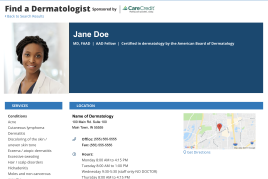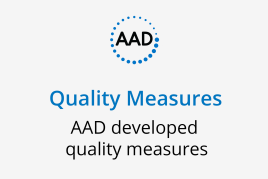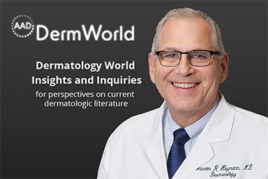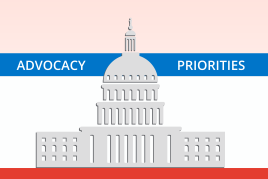Intestinal obstruction of justice raises a question for dermatology residency applicants: Are you a real doctor?

By Warren R. Heymann, MD
Jan. 19, 2019

Every dermatologist has been asked this question.
Ask Sam (not his real name). Last summer, he and his wife came for their annual skin cancer examinations. Sam, an ordinarily jovial man, seemed out of sorts. He just came from his primary doctor’s office with a doxycycline prescription for diverticulitis. Upon disrobing, Sam’s abdomen appeared distended.
“Do me a favor Sam. Lie down, let me examine your abdomen.”
His rebound tenderness trumped the cutaneous examination.
“I’m calling your doctors and sending you to the ER.”
I subsequently learned that Sam had a colonic perforation necessitating emergency surgery.
On December 22nd, another patient told me of his surgical story, reminding me of Sam. I called Sam just to say hello to see how he was doing, and wish him a good holiday season. Fortunately, he was faring well overall, and grateful for the phone call.
That evening, my brother George drove from New York, with my nephew Keith and his wife Hollie, who were visiting from Houston. A few miles from my home, George called to tell me that he was not feeling well, requesting that my nephew drive the rest of the way. Hollie acknowledged that she was worried.
I ran to the car upon its arrival, immediately observing George’s diaphoresis and rigors. I escorted him to the house to get him undressed — it looked as though he was carrying triplets. “Get up George, we’re going right to the ER at Cooper.” His preference was to lie down and rest. That was not an option. Febrile to 103.7 degrees, shaking chills, and his Hindenburgian abdomen, yielded a CT scan that the ER physician called “horrible” and the surgeon “ugly” (I appreciated the fact that no words were minced). Off George went to the OR for an eight-hour procedure, releasing adhesions, and removing 70 cm of ischemic jejunum. (George’s adhesions were presumably due to perforation from a colonoscopy 20 years earlier, a reversal of a temporary colostomy, and more surgery from a subsequent obstruction a few years ago.) A few days later, his wound dehisced, with bowel evisceration. Back to the OR. His course was complicated by pneumonia and an intraabdominal abscess. His hospitalization lasted just shy of three weeks. He then spent a week in the Kessler rehabilitation facility, being discharged to home (staying with me and my wife, still requiring home nursing help) on January 18th, 2019 — his 70th birthday.
This has to be his best birthday ever – simply because he was at risk for not having seen it. From George’s perspective, his accomplishments as a judge in the Bronx and Brooklyn, prolific writings in the New York Law journal, and his teaching accolades at Hofstra Law School all pale in comparison to his joy when he talks about his beautiful 16-month-old grandson, Brett. The timing of all that transpired could not have been better to assure that Grandpa and Brett will have many future memories to share.
We are in the midst of the dermatology residency interview season. As I have mentioned in prior posts, if you transposed my medical school record to today, I doubt that I would have secured even one interview. Realistically, though, if I was applying to dermatology in 2019 (instead of 1979), either I would have had the same record and chosen another specialty, or (if I was really determined), do what every other applicant is doing — participate in research projects early in medical school, take several dermatology electives at my school and away, obsess over board scores, and pursue a gap year for a fellowship to expand my curriculum vitae.
Students will do what students must do. The arms race to secure a dermatology residency is not of their making. My fear is that because of the laser focus required to secure a dermatology residency position, medical students are shortchanging themselves (and their future patients) by not being adequately exposed enough to the breadth of medicine.
I always cringe when people ask me if I’m a real physician. I know I am. I want the next generation of dermatologists to believe that they are, as well. It is high time to place some limits on dermatology exposure in medical school to assure that our future colleagues think of themselves as physicians first, and dermatologists second.
All content found on Dermatology World Insights and Inquiries, including: text, images, video, audio, or other formats, were created for informational purposes only. The content represents the opinions of the authors and should not be interpreted as the official AAD position on any topic addressed. It is not intended to be a substitute for professional medical advice, diagnosis, or treatment.
DW Insights and Inquiries archive
Explore hundreds of Dermatology World Insights and Inquiries articles by clinical area, specific condition, or medical journal source.
All content solely developed by the American Academy of Dermatology
The American Academy of Dermatology gratefully acknowledges the support from Incyte Dermatology.
 Make it easy for patients to find you.
Make it easy for patients to find you.
 Meet the new AAD
Meet the new AAD
 2022 AAD VMX
2022 AAD VMX
 AAD Learning Center
AAD Learning Center
 Need coding help?
Need coding help?
 Reduce burdens
Reduce burdens
 Clinical guidelines
Clinical guidelines
 Why use AAD measures?
Why use AAD measures?
 Latest news
Latest news
 New insights
New insights
 Combat burnout
Combat burnout
 Joining or selling a practice?
Joining or selling a practice?
 Advocacy priorities
Advocacy priorities
 Promote the specialty
Promote the specialty

